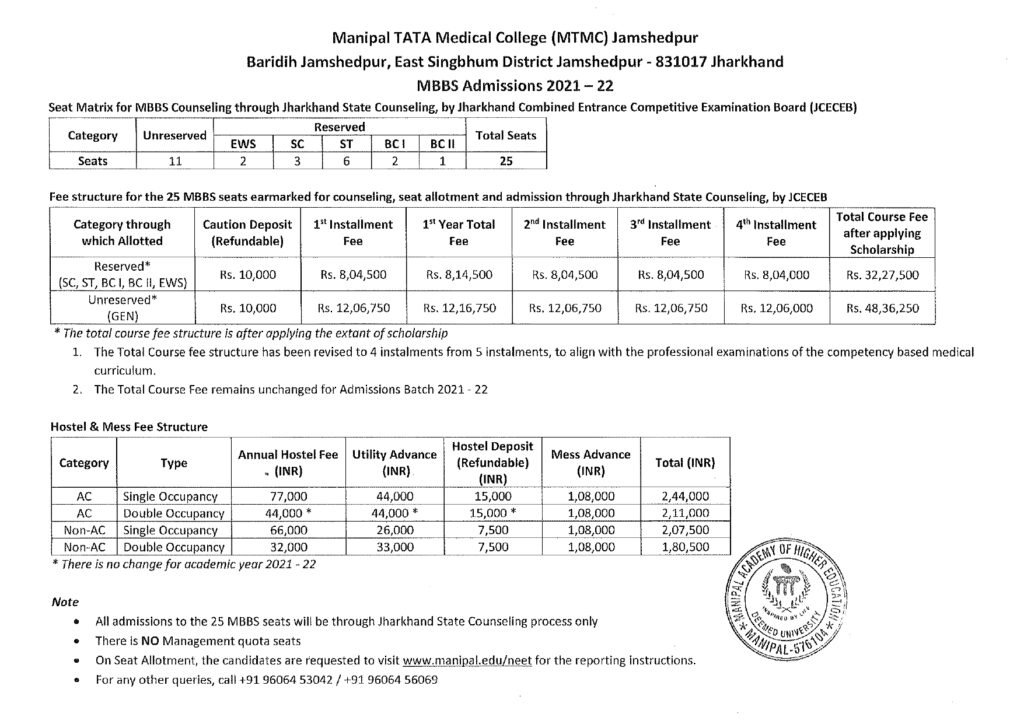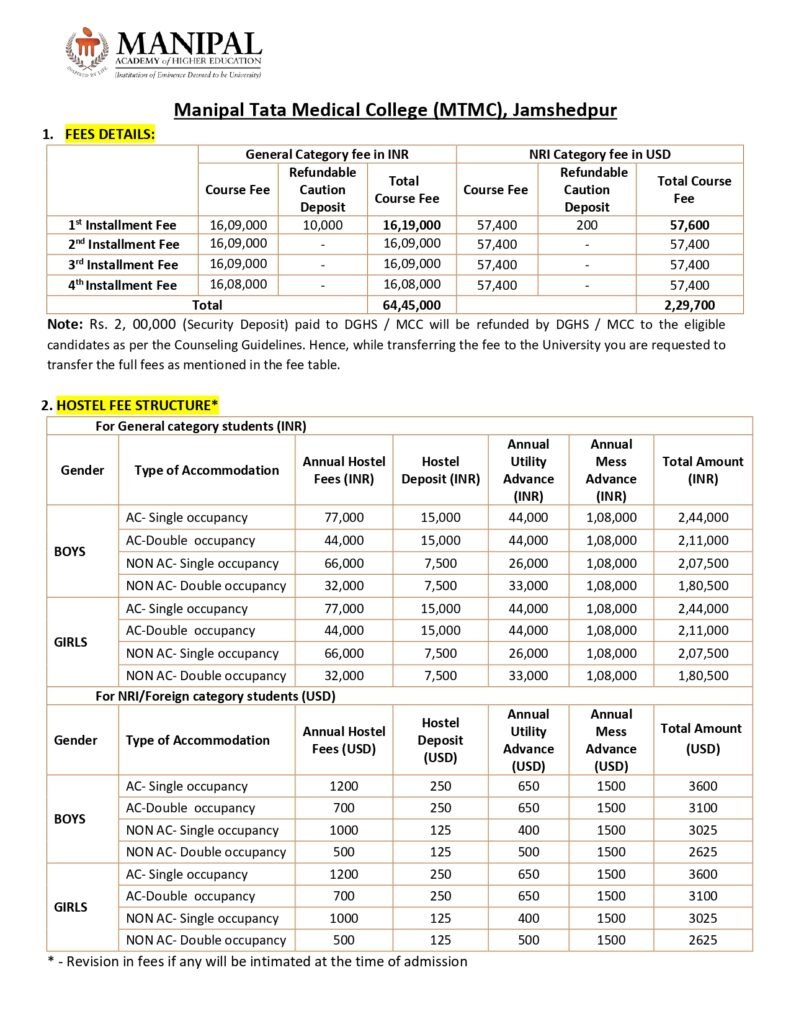About Manipal Tata Medical College
Manipal Tata Medical College (MTMC) Jamshedpur, is the first private-private partnership initiative in health sciences. A collaborative venture between the Manipal Institute of Higher Education (MAHE) and Tata Steel, the college is located at Baridih, Jamshedpur, in the east Indian state of Jharkhand.
Manipal Group
In 1953, Dr T M A Pai founded the Kasturba Medical College on a barren hill on the outskirts of the town of Udupi in Karnataka, India. In the subsequent years many other academic institutions followed, and this vibrant campus developed into the town of Manipal. All these institutions were brought under the umbrella of the Manipal Academy of Higher Education (MAHE) that became deemed to be University in 1993.
Today, MAHE is synonymous with excellence in higher education. Over 30,000 students from 65+ different nations live, learn, and play in the sprawling University town nestled on a plateau. It also has nearly 2,500 faculty members and 10000+ support and service staff, who cater to the various professional institutions for Health Sciences, Engineering, Management, Communication and Humanities, which dot the WiFi-enabled campus.
The University has off-campuses in Mangalore and Bangalore, as well as off-shore campuses in Dubai (UAE) and Melaka (Malaysia). The Mangalore Campus offers medical, dental and allied health programmes. The Bangalore Campus offers programmes in regenerative medicine. The Dubai campus offers programmes in engineering, management and architecture, while the Melaka Campus offers programmes in medicine and dentistry. Every institute under MAHE Manipal has world-class facilities and pedagogy, which are constantly reviewed and upgraded to reflect the latest trends and developments in higher education.
Tata Group
Founded by Jamsetji Nusserwanji Tata in 1868, the Tata Group is a global enterprise, headquartered in Mumbai, India. From an early foray into power, steel and hotels, to staying abreast of the latest technologies, the Tata Group today has a strong presence across diverse industries such as agrochemicals, automotive, chemicals, construction, finance, consumer products, and hospitality.
The group operates in more than 100 countries across six continents, with a mission ‘To improve the quality of life of the communities we serve globally, through long-term stakeholder value creation based on Leadership with Trust’.
Tata Sons is the principal investment holding company and promoter of Tata companies. Sixty-six percent of the equity share capital of Tata Sons is held by philanthropic trusts, which support education, health, livelihood generation and art and culture.
Tata Steel
Tata Steel was established in India as Asia’s first private integrated steel company in 1907. With this, the Company also developed India’s first industrial city at Jamshedpur. Tata Steel is one of the few steel operations that is fully integrated – from mining to the manufacturing and marketing of finished products. Tata Steel is the flagship company of the Tata Group and is headquartered in Mumbai, Maharashtra, India. Its marketing headquarters is located in Kolkata, West Bengal. Its major manufacturing units in India are located in Jamshedpur, in the East Singhbhum district of Jharkhand, and in Kalinganagar, in the Jajpur district of Odisha along with captive iron ore and coal mines in the states of Jharkhand and Odisha.
In 2018, Tata Steel acquired Bhushan Steel (now renamed as Tata Steel BSL) at Angul in Odisha and the steel business of Usha Martin (now renamed as Tata Steel Long Products) at Gamharia, Jamshedpur in the Sareikela-Kharsawan district of Jharkhand. Tata Steel primarily serves customers in the automotive, construction, consumer goods, engineering, packaging, lifting and excavating, energy and power, aerospace, shipbuilding, rail and defence and security sectors. The Tata Steel group comprising Indian, European and South East Asian operations is among the top global steel companies with an annual crude steel capacity of 34 million tonnes per annum. It is one of the world’s most geographically-diversified steel producers, with operations and commercial presence across the world. Today, it operates in 26 countries and have a commercial presence in over 50 countries with employees across five continents. The Company’s Kalinganagar plant is the first and only Indian manufacturing facility to be included in the World Economic Forum’s Global Lighthouse Network.
Building a business that is as relevant and impactful tomorrow as it is today calls for a culture of agility. The Company is leveraging its innovation capabilities, technology leadership and sustainability focus to create long-term value for its stakeholders.
Tata Main Hospital (TMH)
The first hospital of Jamshedpur, Tata Main Hospital (TMH) was started in 1908 by Tata Steel. It is now one of the largest hospitals in Jharkhand. With 983 beds, TMH has a footfall of over 16.5 lakh OPD patients and 60000 admissions annually, with year-on-year increase of customer satisfaction and advocacy measured through a robust Net Promoter Score (NPS) methodology. TMH provides tertiary healthcare services through outpatient, inpatient and round-the-clock emergency services. Diagnostic services include Pathology, Radiology and Nuclear Medicine. Advanced diagnostic services like CT and MRI scans are available in TMH as well as at the Meherbai Tata Memorial Hospital (MTMH) located nearby. In addition to general wards, TMH offers intensive care to its patients through its Critical Care Unit (CCU), Intensive Care Unit (ICU), Paediatric Intensive Care Unit (PICU), Burns Care Unit (BCU), Intermediate Medical Care Unit (IMCU) and High Dependency Unit (HDU). There are 13 modular operation theatres for all specialties with a dedicated one for Burns Care. TMH also provides super-speciality services in Cardiology, Neurology, Neurosurgery, Nephrology, Urology, Paediatric Surgery and Gastroenterology.
There are 7 clinics supported by TMH spread across Jamshedpur to provide primary healthcare services. The hospital also serves as a teaching institute with DNB courses offered in a number of specialties. TMH is now the designated COVID-19 hospital for East Singhbhum and Sareikela-Kharsawan districts of Jharkhand. It is the first private hospital in Jharkhand to be certified by the Indian Council of Medical Research (ICMR) for RT-PCR diagnostic test for COVID-19.
MBBS Courses and Fees
The MBBS program fees at Manipal Tata Medical College, Jamshedpur, are approximately ₹14,30,000 per year for Indian students, while international students are required to pay around $51,000 annually. Additional expenses include hostel fees ranging from ₹65,000 to ₹121,000, depending on whether you opt for non-AC or AC accommodations, along with mess charges of around ₹1,08,000 per year.


Manipal Tata Medical College Facilities
Manipal Tata Medical College (MTMC) in Jamshedpur offers a variety of facilities aimed at enhancing the educational and residential experience for its students. Key facilities include:
Academic Infrastructure: The campus includes advanced laboratories for anatomy, physiology, biochemistry, and pathology, allowing students hands-on experience in their coursework. An extensive library offers a vast collection of medical textbooks, journals, and digital resources that support research and learning.
Hostels: MTMC provides well-furnished hostel accommodations with options for both air-conditioned and non-air-conditioned rooms. Separate hostels are available for male and female students, featuring amenities like Wi-Fi, mess facilities, and recreation areas to support a balanced student life.
Clinical Training: Students benefit from MTMC’s affiliation with Tata Main Hospital (TMH) in Jamshedpur. This partnership provides MBBS students with practical, clinical training across various specialties, offering exposure to diverse cases and real-time medical practices.
IT and Digital Resources: A robust IT infrastructure supports students’ academic activities, including smart classrooms and access to digital resources and online learning tools.
Cafeteria and Health Facilities: The college has a cafeteria that serves a variety of meals and a medical center providing healthcare services to students and faculty.
These facilities combine to create a well-rounded environment for both academic and personal growth at MTMC, enhancing the overall experience of medical education at the institute.
